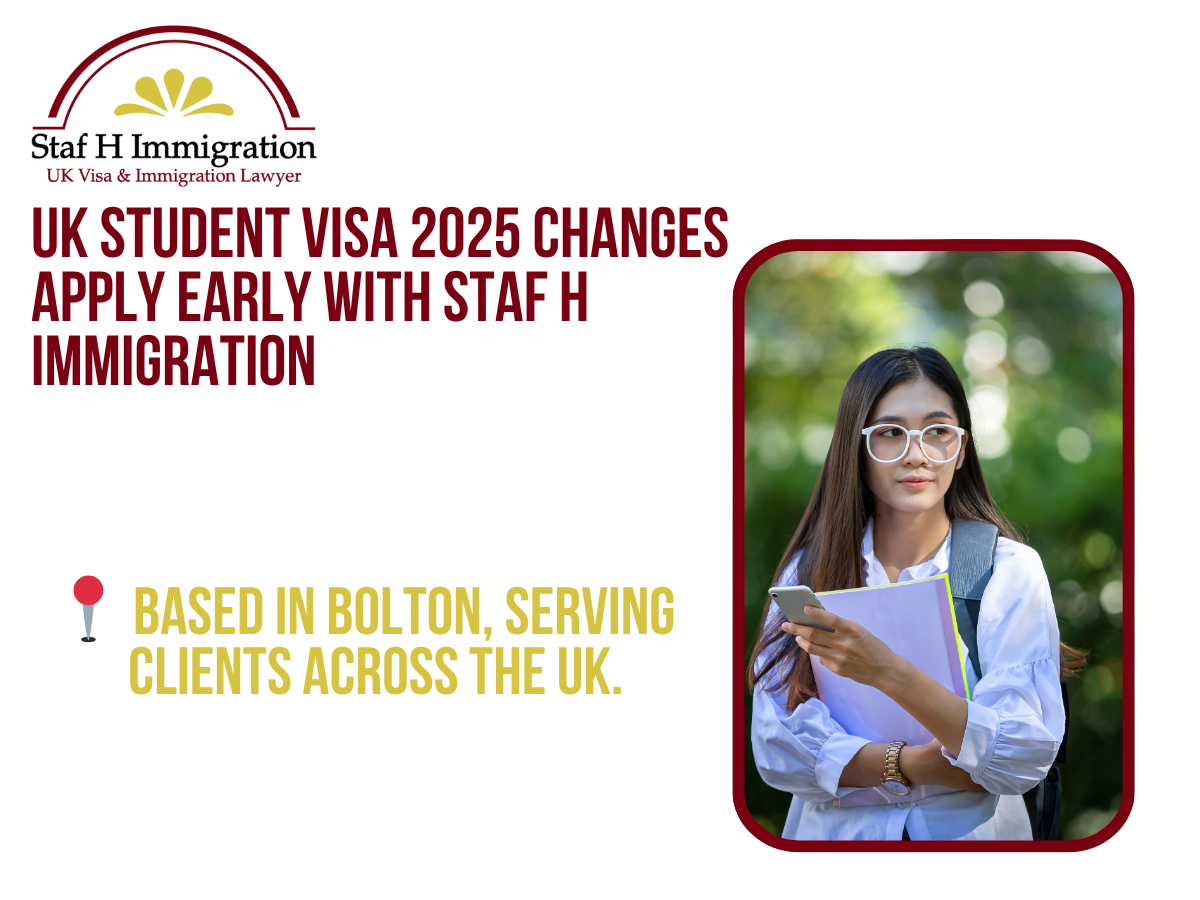Studying in the United Kingdom remains one of the most rewarding opportunities for international students worldwide. The UK’s world-class universities, innovative research environment, and vibrant culture make it a top destination for higher education.
However, the UK Student Visa landscape is changing in 2025, and anyone planning to study in Britain must understand these updates before applying.
This detailed guide from Staf H Immigration, a trusted team of UK immigration specialists, breaks down everything you need to know — the new rules, eligibility, application steps, and why acting early can protect your study plans.
1. Why the UK Student Visa Is Changing in 2025
The British government regularly reviews its immigration policies to balance economic needs with public sentiment. In 2024 and 2025, several reforms were introduced to control migration levels while ensuring that genuine students can continue to study and contribute positively to the UK.
The latest changes have been driven by:
- A rise in international student numbers, especially postgraduate dependants.
- Pressure to reduce net migration, leading to tougher entry and post-study conditions.
- Economic restructuring, with universities encouraged to attract high-value, long-term talent.
These reforms aim to maintain the UK’s reputation for academic excellence while tightening the visa routes that were previously misused.
2. Overview of Key 2025 Changes to the UK Student Visa
Below is a clear summary of the most important updates international applicants should know:
a) Restrictions on Dependants
As of January 2024 (and fully enforced throughout 2025), most international students can no longer bring dependants to the UK unless they are enrolled in a PhD or research-based postgraduate programme.
This means:
- Taught master’s students can no longer sponsor spouses or children under the Student Visa route.
- Only students on research doctorates or specific postgraduate courses qualify.
This change is designed to reduce non-student migration numbers but has made the process more complex for families.
b) Higher Financial Maintenance Requirements
In 2025, the UK Home Office increased the financial evidence requirement for students.
Applicants must now show higher living-cost funds before receiving a visa.
New Maintenance Requirement (outside London):
👉 £1 ,023 per month (up from £1 ,023 previously — under review for 2025 adjustment).
In London:
👉 £1 ,334 per month (reflecting higher living costs).
Students must demonstrate proof of funds for up to 9 months of study expenses, along with full payment or confirmation of tuition fees.
c) Updated Rules for Switching Visas
The Home Office has tightened restrictions on switching from a Student Visa to other categories while still studying.
From 2025 onwards, students cannot switch to Skilled Worker, Graduate, or Partner Visas unless they have completed their course.
This means you must finish your degree before applying for post-study or work visas. The goal is to prevent misuse of the student route for early employment.
d) Stricter CAS and University Sponsorship Requirements
Universities are now under greater scrutiny to ensure all international students are genuine and academically capable.
Institutions that fail to maintain compliance could lose their CAS (Certificate of Acceptance for Studies) sponsorship rights.
Expect:
- More pre-CAS interviews and academic checks.
- Verification of financial statements and English proficiency before a CAS is issued.
- Delays in CAS processing if documentation is incomplete.
This change underscores the need for careful application planning and professional document preparation — something Staf H Immigration can expertly manage for you.
e) Post-Study Work (Graduate Visa) Review
The government is conducting a full review of the Graduate Visa, which allows international graduates to work in the UK for 2 years (or 3 years for PhD holders).
While the Graduate Visa remains valid in 2025, future reforms may:
- Reduce its length or limit eligible job roles.
- Link extensions to specific high-demand sectors.
- Introduce minimum-salary thresholds.
For now, applicants in 2025 can still benefit from this route — but acting early is the safest strategy to avoid being caught by upcoming changes.
f) Application Fees and Healthcare Surcharge Increase
Visa fees and the Immigration Health Surcharge (IHS) have risen.
From 2025, new rates are expected to apply as follows:
- Student Visa application: £490 (approx.)
- Immigration Health Surcharge: £776 per year of study
This can significantly impact overall budgeting. It’s crucial to calculate these costs before starting the process and explore any financial aid available through your university.
3. Who Qualifies for a UK Student Visa in 2025
The UK Student Visa is open to students aged 16 and above who want to study in the UK at an approved institution.
To qualify in 2025, you must meet the following updated requirements:
✅ Offer from a Licensed Sponsor
You must hold an unconditional offer from a university or institution with a Student Visa Sponsor Licence.
✅ Valid CAS Number
Once accepted, your university issues a CAS (Certificate of Acceptance for Studies) confirming your enrolment.
The CAS number is essential for your visa application.
✅ Financial Capability
You must show proof you can pay tuition and living costs, as per the updated maintenance funds mentioned above.
✅ English Language Proficiency
Applicants must pass an approved Secure English Language Test (SELT) such as IELTS Academic or PTE Academic.
Certain exemptions apply for students from English-speaking countries.
✅ Genuine Student Intent
The Home Office may require an interview to confirm your academic and financial intentions.
4. The UK Student Visa Application Process – Step-by-Step
Step 1 – Prepare Your Documents
Typical required documents:
- Valid passport
- CAS number from your university
- Proof of funds (bank statements or sponsorship letters)
- Proof of English language proficiency
- Tuberculosis (TB) test results (if applicable)
- Parental consent (for students under 18)
Tip: Ensure all documents are translated into English by certified translators if needed.
Step 2 – Apply Online
Submit your application on the official UK Government website.
You’ll need to pay the visa fee and IHS during submission.
Step 3 – Attend Your Biometric Appointment
Book a biometric appointment at a Visa Application Centre (VAC) to provide fingerprints and a photograph.
Step 4 – Wait for a Decision
Processing times usually range from 3 to 8 weeks depending on your country and the time of year.
Priority services may be available for an extra fee.
Step 5 – Arrive in the UK
Once approved, you receive a visa vignette in your passport (valid for 90 days).
After arrival, you’ll collect your Biometric Residence Permit (BRP) within 10 days.
5. Common Mistakes That Cause Visa Delays or Refusals
Even qualified students can face visa refusals due to avoidable errors.
Here are the most frequent mistakes to watch out for:
- Submitting incorrect bank statements or insufficient funds.
- Providing incomplete translations of foreign documents.
- Using outdated CAS details or wrong course codes.
- Missing the English test requirement.
- Failing the credibility interview due to poor preparation.
At Staf H Immigration, we help students avoid these pitfalls by carefully reviewing every document and guiding them through mock interviews and financial proof checks.
6. Why Applying Early Matters in 2025
Given the new restrictions and fee increases, early application is crucial.
Delaying your application could mean being subject to stricter requirements or missing your university’s CAS deadline.
Applying early ensures:
- Faster processing before peak season.
- Access to current visa fees and funding thresholds.
- Enough time to correct mistakes or submit additional evidence if needed.
7. Life After Arrival – What Every International Student Should Know
Arriving in the UK is exciting, but it also comes with important legal and academic responsibilities. Understanding what to do after landing helps you avoid compliance issues that might affect your visa status.
a) Collect Your BRP (Biometric Residence Permit)
Your BRP is your official proof of immigration status in the UK. You must collect it within 10 days of arrival from the designated Post Office or university collection point listed in your visa letter.
Keep this card safe — you’ll need it for:
- Opening a bank account
- Registering with your university
- Renting accommodation
- Proving your right to study or work
b) Register with the Police (If Required)
Some nationalities are required to register with the local police station within 7 days of arrival. Always check your visa decision letter to confirm whether this applies to you.
c) Attend University Induction and Enrolment
Universities are required by the Home Office to report student arrivals and attendance.
Missing your enrolment appointment could result in your CAS being withdrawn, which automatically cancels your visa.
d) Understand Your Work Rights
The Student Visa allows you to work part-time in the UK, but strict limits apply:
- Up to 20 hours per week during term time.
- Full-time during official holidays or breaks.
- No self-employment, freelance, or professional sports work.
Breaking these conditions can result in visa curtailment, so always double-check with your university’s international office or a licensed immigration adviser like Staf H Immigration.
8. Post-Study Work Opportunities in the UK
The UK government introduced the Graduate Route Visa to allow international students to gain practical experience after completing their studies.
Graduate Visa Overview
- Duration: 2 years (Bachelor’s or Master’s graduates)
- Duration: 3 years (PhD graduates)
- You can work in any role, at any skill level.
- You don’t need employer sponsorship.
It’s one of the most flexible post-study work routes globally, but as of 2025, the Home Office is reviewing this policy to align it more closely with the UK labour market.
That’s why experts like Staf H Immigration advise students to apply immediately after graduation — before any new limitations take effect.
9. Transitioning from Student Visa to Skilled Worker Visa
If you secure a job offer from a Home Office–approved employer, you can switch from your Graduate or Student Visa to a Skilled Worker Visa.
Requirements:
- Valid job offer from a licensed sponsor.
- Job meets minimum skill level (RQF Level 3 or higher).
- Minimum salary threshold (usually £38,700/year, though this can vary by role).
- Proof of English language ability.
Benefits:
- Long-term stay (up to 5 years, renewable).
- Eligibility for Indefinite Leave to Remain (ILR) after 5 years.
- Pathway to British Citizenship.
10. From Student to British Citizen – The Long-Term Path
Many international students dream not just of studying in the UK, but of building a life and career there.
Here’s how the journey typically unfolds:
| Stage | Visa Type | Duration | Key Requirement |
|---|---|---|---|
| Step 1 | Student Visa | Duration of study | Valid CAS and funds |
| Step 2 | Graduate Visa | 2–3 years | Completion of degree |
| Step 3 | Skilled Worker Visa | 5 years | Sponsored job |
| Step 4 | ILR (Indefinite Leave to Remain) | Permanent | 5-year lawful residence |
| Step 5 | British Citizenship | Permanent | 1 year after ILR |
Staf H Immigration supports clients at every stage — from the first student visa to ILR and citizenship applications — ensuring every document, timeline, and legal condition is perfectly aligned.
11. How the 2025 Changes Affect Future Career Plans
The new 2025 updates may seem restrictive, but they also reward well-prepared students who plan strategically.
- Graduate Visa reforms may introduce job-related limits — so graduates with early work offers will have an edge.
- Financial requirement hikes mean stronger preparation shows credibility.
- Dependants rule changes may push families to apply under skilled routes instead.
This makes expert legal support from immigration professionals more valuable than ever.
12. Tips for a Successful UK Student Visa Application in 2025
Whether you’re applying from Pakistan, India, Nigeria, or any other country, these professional tips can help you secure approval faster:
- Start Early – Begin gathering your financial documents at least 3 months before applying.
- Be Consistent – The name on your passport, CAS, and bank documents must match exactly.
- Avoid Sudden Bank Deposits – The Home Office may reject unexplained lump sums.
- Use Reliable Translations – Documents not in English must be certified by an accredited translator.
- Ace Your Credibility Interview – Prepare to explain your course choice, future goals, and reasons for studying in the UK.
- Seek Professional Review – Have your entire application reviewed by a regulated immigration adviser before submission.
13. How Staf H Immigration Helps Students Secure Their UK Future
At Staf H Immigration, our mission is to make your UK study journey smooth, secure, and successful.
Here’s how we stand out among immigration consultants:
✅ Tailored Visa Strategy
We evaluate your background, finances, and goals to create a personalised visa plan — whether for undergraduate, postgraduate, or research study.
✅ Full Application Support
From CAS and bank statements to IHS payments and biometric scheduling — we handle every step to avoid mistakes and delays.
✅ Mock Interviews & Credibility Training
Our experts conduct mock Home Office interviews, helping students confidently answer credibility questions.
✅ Dependants & Family Guidance
For research or PhD students eligible to bring dependants, we prepare flawless dependent visa applications ensuring families stay together.
✅ Post-Arrival and Extension Help
Once you’re in the UK, our team assists with Graduate Visa, Skilled Worker transitions, and even settlement applications when you become eligible.
With years of experience and a high success rate, Staf H Immigration remains the trusted partner for students pursuing their UK education dream.
14. Key Reasons to Apply Early in 2025
The UK’s visa environment is evolving rapidly. Waiting too long to apply could expose you to:
- Higher fees and surcharges
- Reduced work rights
- Delays in CAS issuance
- Stricter credibility assessments
By applying early through Staf H Immigration, you can:
- Lock in current visa benefits before new restrictions.
- Receive priority document review and fast-tracked filing.
- Enjoy peace of mind knowing your case is handled by licensed professionals.
15. Common Questions About the UK Student Visa (2025 Edition)
Q1: Can I bring my spouse or children with me in 2025?
Only PhD or research-based postgraduate students can bring dependants under the current rules.
Q2: Can I work full-time during my studies?
No. You may work up to 20 hours weekly during term and full-time only during vacations.
Q3: What happens if my visa is refused?
You can request an administrative review or reapply with corrected documents.
Staf H Immigration can assist with refusal appeals and resubmissions.
Q4: Can I switch to another visa type from the UK?
Yes, after completing your course you can switch to a Graduate or Skilled Worker Visa.
Q5: How long does it take to process a student visa?
Usually 3–8 weeks. Priority and super-priority services are available in many countries.
16. Real Success Stories from Staf H Immigration Clients
“Staf H Immigration made my UK Student Visa journey effortless. They handled everything — from my CAS verification to my visa interview preparation. I received approval within 3 weeks!”
— Ahmed R., MSc in Data Science, University of Manchester
“I was confused about my dependants’ eligibility after the rule change. The Staf H team explained everything clearly and helped me plan my study route with confidence.”
— Fatima K., PhD Candidate, University of Leeds
These testimonials reflect the commitment, transparency, and expertise that make Staf H Immigration a trusted choice for students worldwide.
17. Preparing for Your Future in the UK
The UK remains one of the most attractive destinations for students — offering global exposure, diverse culture, and exceptional career prospects.
While the Student Visa 2025 changes may introduce challenges, with proper planning and expert guidance, they can be easily managed.
Whether you’re aiming for a Bachelor’s degree, a Master’s programme, or a PhD, the key is to start your visa process early and ensure compliance at every step.
18. Final Thoughts: Secure Your Place in the UK with Staf H Immigration
The message is clear:
Apply early. Prepare properly. Partner with professionals.
Delaying your visa process could mean facing new restrictions or higher costs in the months ahead.
By choosing Staf H Immigration, you’ll gain a dedicated partner who ensures your visa journey is legally sound, stress-free, and fully compliant with 2025 Home Office updates.





